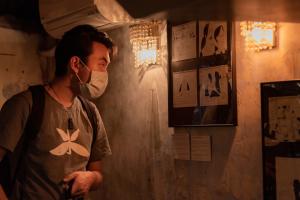Exhibition: Pollution, Data, Activism, 03.20.2021

This collection documents a talk and exhibiton about the Formosa Plastics Global Archive, held on March 20, 2021 at 柏林廢墟Tacheles in Taipei, Taiwan.
Photo Essay: Exhibition 03.20.2021
Photos from a talk and exhibiton about the Formosa Plastics Global Archive, held on March 20, 2021 at 柏林廢墟Tacheles in Taipei, Taiwan. All photos by Jiao Enguan 焦恩光.

COVID19 Places: India

This essay scaffolds a discussion of how COVID19 is unfolding in India. A central question this essay hopes to build towards is: If we examine the ways COVID19 is unfolding in India, does "Ind
COVID19 India Group November 2020 Update
This is a collage made from the visuals discussed by this artifact's contributors at the T-STS COVID19 India Group meeting on November 24, 2020

Scale and "Community"
kguptaThinking through this article and Vermeylen's, something we might consider in ATX is how we conceptualize community itself. It is so easy in EJ-contexts to make communities our object of study and analysis, which can erase identities and exclusions within them...
How is ecological harm and gentrification experienced by LGBTQ people in Austin? Women? Etcetera?
Energy and Race
kguptaWhat is the energy sector's relationship to racial capitalism? How is its current configuration shaped by legacies of settler colonialism, state bureaucracy, and corporate investment?
Settler Colonialism in Texas
kguptaEnvironmental justice narratives in the U.S. often fall into "sacrifice zone" narratives that universalize experiences on the community-level, reproducing specifically bounded narratives about American lives and livelihoods, relationships to nature and capital, and the kinds of knowledge and authority that matter. Vermeylen's article disrupts this idea, rightfully arguing that environmental justice requires a more upfront confrontation with the socio-historical causes of oppression brought about by coloniality, as well as the fact that we need to question the righteousness of EJ discourses that rely on white settler logics.
For the Austin Field Campus, how can we bring attention to Anglo-American settler colonialism in our approaches to EJ and gentrification? And thinking back to the NOLA Field Campus, what Texas histories should we be drawing from to understand energy transitions in the city?
Ethical Obligations and the "After"
kguptaProviding a historical overview of EJ-related issues and organzing in Austin, Walsh's piece gestures to the need for deep engagement with those already doing what we might consider 'quotidian anthropocenic' work in our field campus locations. What are our ethical relationships and obligations to those we collaborate with during our time physically in the city? What should they be after? How can our analytical contributions help organizations like PODER and other local activists fighting gentrification and biased zoning laws?

Translation of the event description into Mandarin.